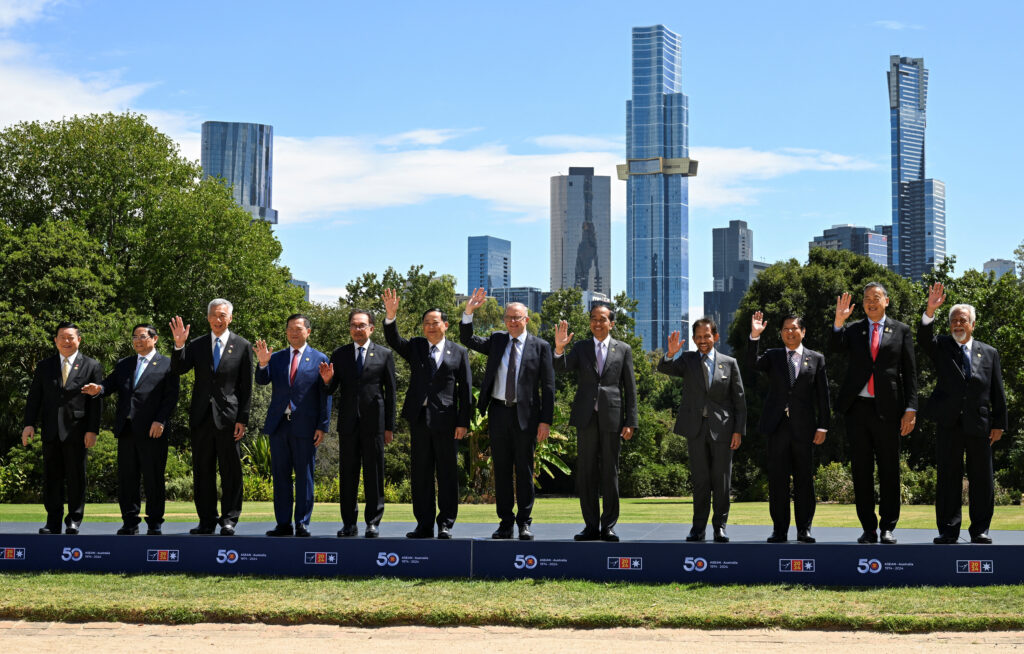The ASEAN–Australia special summit hosted earlier this month by Australian Prime Minister Anthony Albanese in Melbourne cleared the bar for success that Australia’s press and foreign policy commentariat apply to these sorts of things. Australian officials made the requisite shows of solidarity with the Philippines in its efforts to assert its claim over Scarborough Shoal, a major package was announced aiming at deepening economic ties with ASEAN and a succession of bilateral engagements culminated in the announcement of the upgrade of Australia’s relationship with Hanoi to a Comprehensive Strategic Partnership.
Australia thus continues to deepen its relationships with ‘Southeast Asia’ — but what does that mean for the relationship with ASEAN?
Missing from the Summit both in rhetoric and substance was any sign of beefing-up ASEAN as an anchor of a regional order based upon security cooperation and open markets.
Of course, it’s not Canberra’s role to get out in front of the ASEAN membership in proposing or leading efforts to reform and upgrade its institutions. What’s needed for that will be a greater ambition and willingness to invest political and diplomatic capital in that project by ASEAN’s member states.
Malaysian Prime Minister Anwar Ibrahim’s address to the Australian National University, held just after the Melbourne summit, certainly provided a glimpse into that ambition. Anwar made headlines in Australia for his cautions about the risks of seeking to contain China, but his remarks reflect a regional consensus on the dangers of great-power competition, and of the futility of the mission of containing China, that has also been articulated by Singaporean Prime Minister Lee Hsien Loong (who was lauded, implausibly, by Prime Minister Albanese after their bilateral meeting as the leader of a ‘great democracy’.)
Anwar has defied worries about his own political position to consolidate his dominance in Malaysian politics since his appointment as prime minister in 2022. Despite an electorate grumbling about cost-of-living pressures and an opposition determined to exploit Malaysia’s ethnic and religious tensions to drum up support, his government looks set to see out a full five-year term.
The combination of Anwar’s secure political position at home and his apparent ambitions to supply political leadership within ASEAN may come in handy, with Malaysia holding the chair of ASEAN in 2025. The political transition in Indonesia raises uncertainties about the shape of Indonesian foreign policy after the inauguration of Defence Minister Prabowo Subianto as president in October 2024. If ASEAN is not to become cursed by the old joke (classically made about Brazil) — that it has immense potential, and always will — then buy-in by Jakarta to a program of reform and upgrading will be needed.
In this week’s lead article, Liam Gammon surveys Indonesia’s domestic political landscape in the wake of the landslide election of Defence Minister Prabowo Subianto as president in February. With the conduct of the elections roundly criticised by experts, civil society and opposition candidates, a ‘priority for both Prabowo and Jokowi now is containing the controversy over the level of government interference in February’s presidential contest’ as the transition period kicks off,.
‘The basic legitimacy of Prabowo’s victory is not in question — his victory clearly reflects a genuine preference on the voters’ part for a candidate that was sold to them as representing continuity with a popular government that brought stability and economic progress to the country,’ as Gammon writes. While Prabowo’s Gerindra party didn’t benefit as much as anticipated from a coat-tails effect, he will enjoy the backing of the broad coalition of parties that underpinned outgoing President Joko Widodo (Jokowi)’s administration.
As Prabowo prepares to enter office with a strong basis for political authority ready-made for him, the guessing game about his approach to international affairs is in full swing. Prabowo inherits an Indonesia whose elite are increasingly confident of the role Jakarta has to play as a leader of the Global South and a bridge between the developed and developing world on the global stage.
That confidence could be a double-edged sword if, in combination with its incoming president’s nationalism, a view is diffused throughout the Indonesian elite about the country becoming too important for ASEAN.
The default expectation, based on his nationalist rhetoric, is that Prabowo will prove to be a realist who sees his role as maximising Indonesia’s interests in bilateral dealings with the great-power leaders he believes to be his true peers — rather than seeing Indonesia’s comparative advantage in acting as an institution-builder closer to home, and leveraging that regional weight.
If that’s the case then multilateralists in Jakarta could have their work cut out convincing Prabowo to invest his time and energies in the slow and necessarily collaborative effort involved in leading a transformation of ASEAN.
With Indonesia not due to chair ASEAN over the course of Prabowo’s first five-year term (he faces re-election in 2029), there may equally be work ahead for the rest of the region, and especially Malaysia in the driver’s seat next year, to keep Indonesia engaged in the effort to upgrade and mobilise ASEAN influence.
The EAF Editorial Board is located in the Crawford School of Public Policy, College of Asia and the Pacific, The Australian National University.

